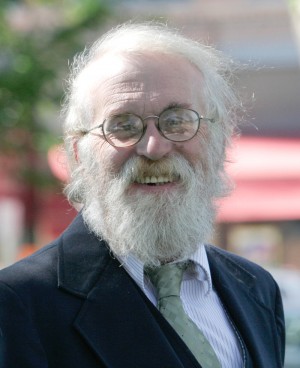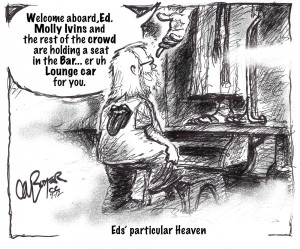By Abby Quillen
My father named me Abigail, which means, “My father is joyful.”
“You were supposed to arrive for your mom’s birthday,” he’d often tell me. “Instead you waited for mine.” I was born ten days before my dad turned 27.
Growing up in the ‘80s and ‘90s, many of my friends had divorced parents. Some of my friends rarely saw their dads, who worked long hours or lived across town. My best friend didn’t know his father at all.
But my dad was ever present. When I was seven, he quit his job as editor of the daily newspaper to freelance out of his home office, a section of my parents’ bedroom cordoned off with overstuffed floor-to-ceiling bookshelves. His desk was off limits to my sister and me – the stacks of dot matrix paper, trays of floppy disks, drawers full of scissors and hole punchers, the butt-filled ashtray, the usually grimy computer keyboard. But my dad was always there.
We ate dinner as a family each night. Then my dad read books to my sister and me: The Boxcar Children, Charlotte’s Web, The Iliad, and The Odyssey. He wrote us his own tales about an adventuresome pica. On weekends we hiked and camped in the mountains.
My father read somewhere that raising “successful daughters” involved teaching girls complex math and encouraging them to help with oil changes, repairs, and other drudgeries.
Apparently operating a manual transmission was on the “successful” list, because my dad insisted on teaching me how to drive his 1975 Chevrolet truck. I white-knuckled the steering column as we pitched down rock-strewn roads in the shadow of the Collegiate Peaks or Sangre de Cristos, my dad lecturing about mountain driving skills like handling washboard and soft shoulders.
Sometimes we’d take the 1965 Dodge Dart instead and drift down the highway listening to The Rolling Stones, my dad’s favorite band. We’d sing along to “Sympathy for the Devil,” my dad drumming his fingers on his windowsill. Or he’d entertain me with stories about how glaciers shaped the valleys thousands of years before, or how the Ute used to camp nearby, or how President Truman had come through Salida on a whistle-stop tour in 1948.
At the time I’d likely have preferred a conversation about plans to buy me a new car for my sixteenth birthday, preferably one manufactured after the disco era. But now I cherish the colossal gift my dad gave me – himself. Our relationship was never formal. He was always interested in what I had to say and what I thought. He wanted me to know him, that he loved peanut butter, salt and vinegar potato chips, and those terrible Lethal Weapon movies, and that he hated chicken.
My dad was a busy man. He wrote three editorials a week for much of his career, he spoke across the state, he built his own computers, and he served on numerous local committees. He corresponded with hundreds of people, answering every letter, every email, and every phone call he received. He’d seemingly conversed with everyone in Salida in the month before he died: “Your dad stopped by my store the other day.” “I ran into your dad down by the river, and we sat and talked.” “Your dad came over all the time.”
But he was never too busy for me. I moved to Oregon ten years ago, and he was still a huge part of my life. We chatted on the phone and shot emails back and forth. We always had plenty to talk about. We both loved politics, presidential history, and the outdoors. We were both freelance writers.
It’s only been two weeks since my dad died, and I’m still staggering up a mountainside of grief, the summit too high for me to see. It’s unthinkable that this man, who was ever present for all of my 34 years, could be gone.
Yet my life marches on. My ten-month-old son scoots across the room, picking up microscopic specks of dirt to examine, beaming toothy smiles at me. It’s impossible not to smile back even in this haze of sorrow. And I think that’s what my father would want – for me to be present for my kids, for my friends, and for my community. He would want me to be joyful.



Oh, Abby, what a great article. The tears are flowing so much I can hardly see. Your mother and I talk on the phone frequently–and it has taken us nearly a year before we haven’t cried each time.